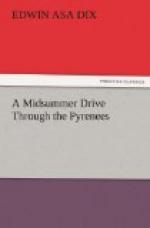Home words, such as these latter, give a glimpse of this people’s home life. For they are devoted to their household as to their tribe, and uniformly show a certain homely honesty and simplicity underneath all their free ways. Love of smuggling does not impugn this honesty,—in their own view, at all events; for the Basque, man and woman, is a born smuggler, and believing it right is not ashamed. Indeed, they make common cause of it; for years, if a revenue officer detected and shot a Basque in the act, he had to fly the land at once, for the entire neighborhood united in seeking hot and deadly vengeance.
The race is notably fond of dancing and drama, and the villages hold frequent open-air theatricals, generally upon religious themes, which they always handle with great seriousness. They have at intervals unique contests in improvisation, rivaling Wolfram and Tannhaueser, or the Meistersingers, in this special talent. They are fruitful, too, in proverb lore, as would be expected in an old race. Their wise saws are sharp, often rasping:
“Hard bread makes sharp teeth.” (Ogi gogorrari haguin sorroza.)
“One eye suffices the seller; the buyer has need of a hundred.”
“Marriage-day is the next day after happiness.”
“Avarice, having
killed a man, took refuge in the Church; it has
never gone out since.”
Husbandmen, herdsmen, fishermen,—such are the majority. The farms are small, averaging four or five acres, and descend by primogeniture; flax, hemp, corn, are their staples. Basques were the first whalers, so it is declared, and St. Jean used to be a noted port for their vessels; the whales have since sought more northern banks, and St. Jean is reduced to the humbler quest of sardines and anchovies. There are iron-mines and marble-quarries, besides, to engage many; hunting and logging are favored pursuits; Basque sailors are to be found in all waters, while great numbers of the younger men are now yearly emigrating to the South American coasts, to make a better living,—and to avoid conscription.
Those of the race we see in our transit impress one, on the whole, favorably. The men have, in the main, the lithe, firm port attributed to them, though there are Basque “trash,” as there are Georgia “crackers,” and average-lesseners everywhere. The women are often noticeably attractive; the younger ones have a ruddy face and full, clear eye, but the skin shrivels and wears with middle age, as does that of their French peasant sisters. The Basques about Biarritz and St. Jean appear to associate with the French element in entire amity; the race strives still to keep distinct, but habits and idioms and manners imperceptibly mingle; they speak French or patois quite as much as their own tongue, and in divers ways hint at the working of amalgamation and assimilation.




